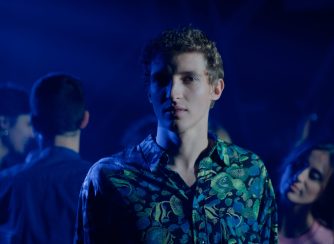Family Therapy Movie Review

FAMILY THERAPY
In a glass villa of cold, sanitized luxury, a wealthy Slovenian family maintains the illusion of a perfect life. But their artificial equilibrium teeters dangerously when a mysterious young Frenchman, with secret ties to their father, bursts into their daily lives.
Film Review
Just by its synopsis, Family Therapy could directly bring to mind a sort of Slovenian version of Bong Joon-ho’s Parasite. A cubic house, completely modernized and inhabited by a family socially and financially above the norm, sees its daily life changed after several encounters with strangers from a much less well-off social class. Beyond this deliberately abrupt extrapolation, the parallels do not end there, although Sonja Prosenc’s work ultimately comes closer to an anthropological zoo than a social satire dissecting profound inequalities in lifestyle.
The term “zoo” actually fits the analysis perfectly. The staging constantly accentuates a certain contrast between man’s technological dependence and his relationship with nature, or at least with what is natural. This large dwelling, encompassing all the comfort options invented by the human race, is a sort of glass cage offering a bird ‘s-eye view of a verdant forest. The lens focuses on this family, paradoxically living in the middle of nature without ever interacting with it.
This is where the “outsiders” of the feature film come in, Julien (played by Aliocha Schneider ) and a family of tourists visibly enduring numerous financial difficulties. All these people embody a certain return to reality for these disconnected bourgeois. Family Therapy becomes a sort of “lite home-invasion”, not so much in line with the horror of Panic Room, but a foreign irruption that comes to shake up established norms. Each member of the family then performs a transgressive act, the youngest gets closer to the environment by taking on a few animal characters, and the mother emancipates herself from her pretentious artistic role to give in to her impulses. Even the father, taking on the role of the last civilized bastion for a long time, ends up entering into a total psychological wandering. Organized family stays
All this is served with some pretty remarkable photography, Mitja Licen ( Piccolo Corpo, Drevo) is a solid argument in favor of the feature film. The tight frame allows you to focus on the few decorative elements present on the screen, always magnificently highlighted by a millimeter calibration. The interior and exterior passages are wonderfully distinguished, reinforcing this sensation of seeing the characters move forward in a familiar environment, or on the contrary, outside their usual comfort zone.
However, there is still a difficulty in truly taking a proper look at the elements that the film criticizes in Family Therapy. The absurdity is never absurd enough to push towards social satire, the confrontations between “poor” and “rich” are more of a detail than a real background running through the whole story. The concept of family itself is quite lacking, the fault of characters who never benefit from balanced writing: the interactions are banal, a little tiresome in the long run as no connection is really made or unmade. The film seems to comfort itself in its aesthetic beauty so as not to always have to bring issues to the forefront. Organized family stays
Boredom, the monotony of a daily life dictated by money and an excess of comfort could have been a theme exploited to correspond to these moments of pause imposed by the feature film, but it seems that like many other ideas, this one would surely not have germinated. Thus remains a falsely random mixture of situations, alternating between the dark looks of an ironically mute Aliocha Schneider, the spatial whims of a somewhat naive father, and the malaise of the two women of the house. With such a panorama, it indeed seemed complex to join all the ends to form an impactful whole.
Family Therapy nonetheless remains a work that attempts, that searches for itself, but whose attempts are laborious. It’s difficult to get caught up in the game when the feature film itself seems slightly shaky in what it wants to tell or criticize. There’s no doubt that the interpretations will be plural, which is a strength in itself, it’s a shame that each of them will surely conclude with an incomplete analysis. Sonja Prosenc’s film is an eclectic mass, a little clumsy and heavy but never withdrawn, sometimes the whole thing rushes headlong, even if it means breaking the window of our disbelief.